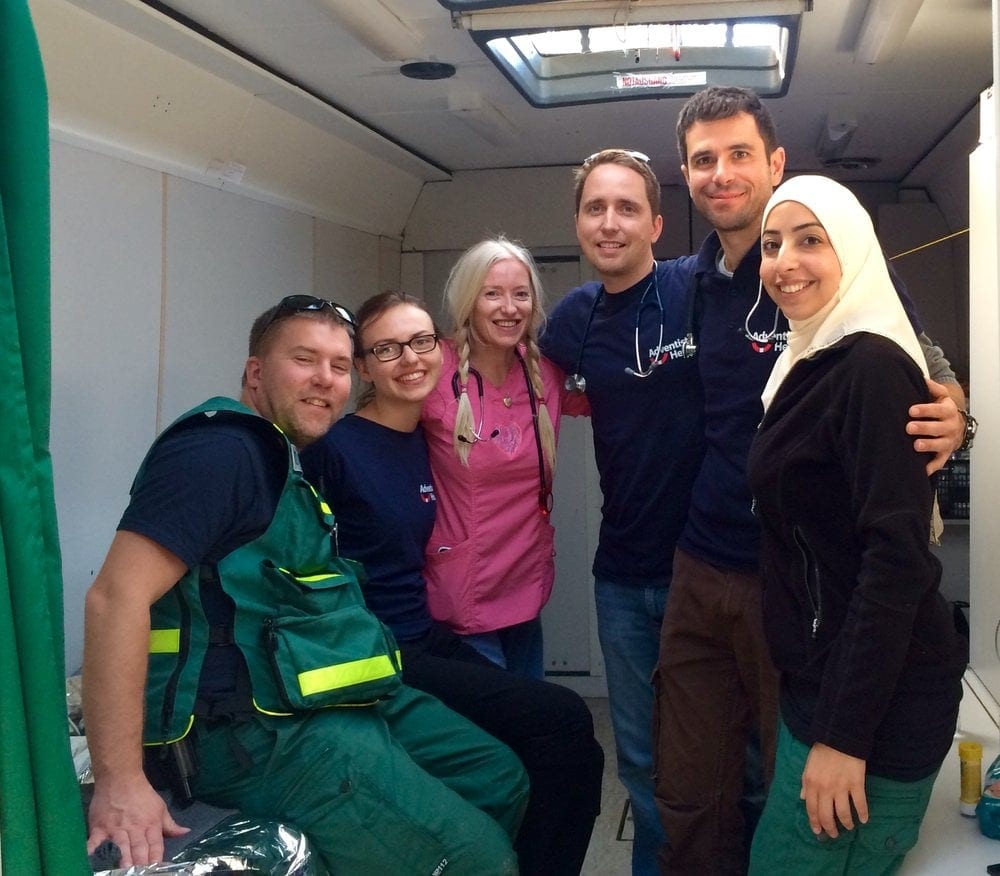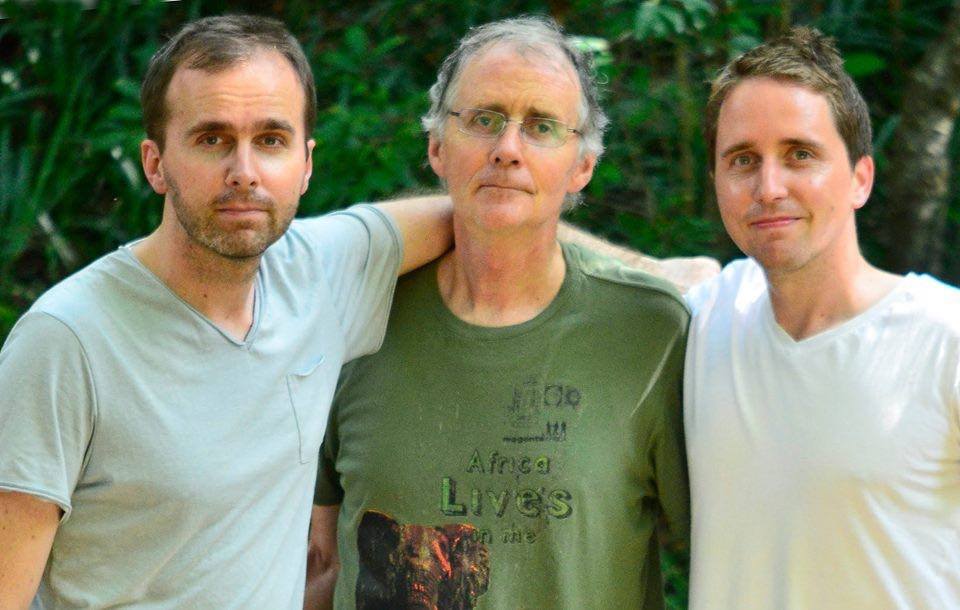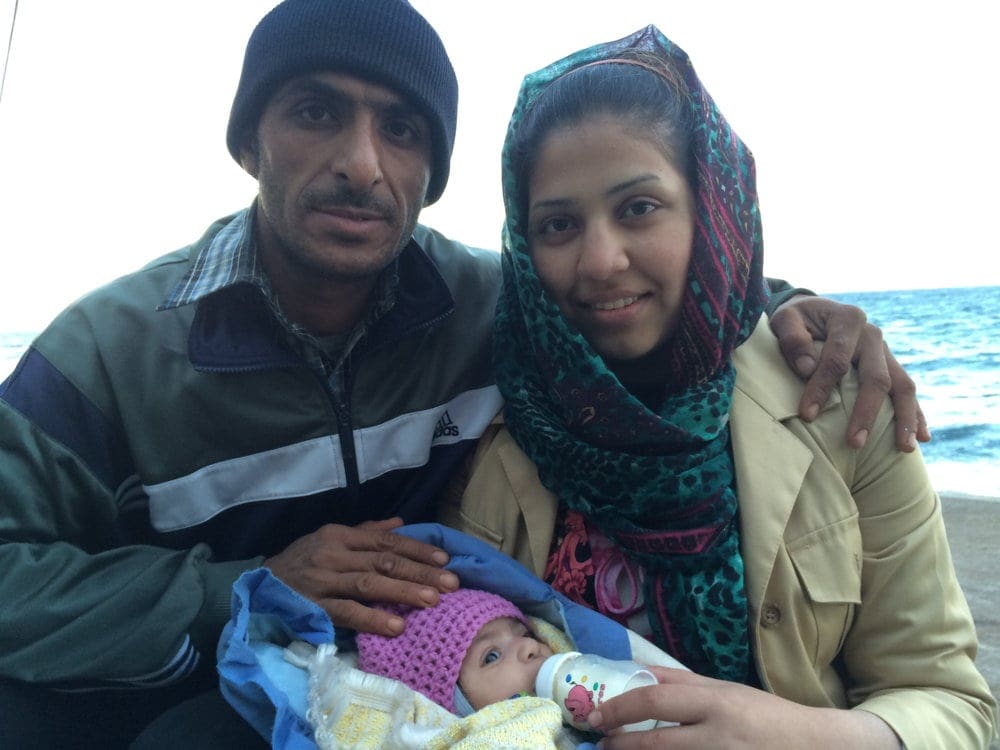
, news editor, Adventist Review
Michael-John Von Hörsten, a 30-year-old Seventh-day Adventist medical doctor from South Africa, lives at the epicenter of Europe’s migrant crisis — a stretch of beach on the Greek island of Lesbos where hundreds of wet, frightened children and adults wash up daily.
Von Hörsten has witnessed a nonstop flow of weeping, bleeding, and sometimes dying migrants since he arrived two weeks ago to join a volunteer medical team assembled by
ASI-Europe, an organization of Adventist laypeople that is assisting migrants across Europe and operates a mobile clinic aboard a bus parked on Lesbos’ northern beach.
“Another crazy morning,” Von Hörsten said Friday in a series of Facebook and e-mail exchanges with the
Adventist Review. “Two hundred people in a large boat just beached with loads of wet and terrified kids. Simply crazy.”
Several hours later, he wrote to apologize for a delay in sending a promised batch of photos by e-mail.
“I had to attend to another emergency,” he said. “A 20-year-old drowned, and we were to late. This place is macabre.”
This is a typical day for Von Hörsten, a general practitioner who is passionate about emergency medicine and humanitarian relief. Every day, he sees five to 30 boatloads of migrants arrive on the beach in a desperate flight from wars in Syria, Afghanistan, and Iraq. More than 300,000 migrants have landed in Lesbos this year, a third of them in October alone, making the island the top destination for migrants seeking to enter Europe, according to international humanitarian groups.
The migrants cram into rubber boats and dilapidated ships in Turkey, located just 6 miles (10 kilometers) from Lesbos, as they willingly risk increasingly cold and choppy winter waters in their search for better lives. On clear mornings, Von Hörsten can see Turkey’s coast as he and other medical volunteers wait for the first boats to arrive.
“We’re at the epicenter of it all,” Von Hörsten said. “Typically mornings are quieter — except for this morning — and the boats start to arrive around midday. They continue arriving until way into the night. We screen everyone and treat all medical issues in our clinic bus. We just fit in sleeping, eating, and resting whenever we get a chance.”
Read: From Austria to Britain, Adventists reach out to migrants
The mere sight of a boat arriving on the beach is a touching experience for Von Hörsten. It’s an arduous trip, he said. The people are exhausted. There are piles of children and quite a number of elderly. The boats are completely overloaded, and people are hanging over in the water.
“Reaching land, they collapse on the beach and sob their hearts out,” Von Hörsten said. “Most can’t speak English but just say, “Thank you, thank you, thank you” and “I love you, I love you” to everyone they see. You can see they are a shattered group of people.”
On Thursday, a chatty boy from Afghanistan who had had a particularly rough crossing in bad weather looked with bewilderment at Von Hörsten and asked in broken English why the water was so salty.
“He'd never seen the sea before,” Von Hörsten said. “What an introduction!”
On the same boat was a 70-year-old man who had carried his child with cerebral palsy in his arms all the way from Syria.
Later that day, the coast guard brought in an unconscious Afghan girl suffering from severe hypothermia.
“She looked terrible,” Von Hörsten said. “We ended up resuscitating her for two hours on a restaurant table during their busiest time. Today we heard the news that she is out of the hospital’s intensive care unit and doing really well. There have been a number of similar cases.”
Although such dramatic events are memorable, Von Hörsten said he also has been inspired by simple moments: carrying a 105-year-old Afghan woman out a boat so her feet don’t get wet; drying off a 3-year-old Syrian child; warming and dressing a shivering Iraqi paraplegic with a gunshot injury to his spine.
“Seeing all the barriers broken down is what I find so special,” he said. “The people are so open.”
The busy days and nights have provided Von Hörsten and the small team of ASI medical volunteers, called Adventist Help, with a new perspective about Jesus.

The four Adventist volunteers, who also include Laura Lacatushu and Tobias Göbel of Germany and Richard Buchli of Switzerland, discussed this week how their beach program follows Jesus’ formula for reaching people as described in Matthew 25:35-36.
The passages reads: “I was hungry and you gave me something to eat, I was thirsty and you gave me something to drink, I was a stranger and you invited me in, I needed clothes and you clothed me, I was sick and you looked after me.” (NIV).
“We’re on the beach all day welcoming, comforting, dressing, warming, treating, and caring for the incoming groups,” Von Hörsten said. “Every evening when it gets cold our clinic bus is filled with dozens of wet terrified children, and we warm, dress and feed them. It’s such a privilege.”
In such an acute situation, it is impossible to convey the finer truths of the gospel, he said.
“We’re here to care for them and point them to Jesus by doing so,” he said. “That’s all.”
The Adventist volunteers also have worked with volunteers from other faiths, including Muslim doctors and nurses whom Von Hörsten described as “a huge help.”
Read: ADRA’s drive to send aid to Lesbos takes Slovenia by storm
People who know Von Hörsten describe him as a compassionate Christian with “a very unassuming character.” He and his older brother, Friedrich, 32, are both medical doctors who work worldwide with International SOS at remote sites, doing corporate work to fund their own humanitarian ventures, particularly with the Adventist Church. Friedrich is currently working in Ghana but will join his brother on Lesbos in a few days.
Their father, Frieder von Horsten, trained as an Adventist pastor but long ago took a job as a teacher at the church-run Helderberg high school near Cape Town, South Africa, because he felt it would give him more time with his young family, friends said. Their mother, Michelle, is a music teacher, and the sons play the violin and cello. The parents also are known for talking stunning wildlife photography.
Von Hörsten’s maternal grandfather is quite the witnessing legend in South Africa, said Penny Brink, who has known Von Hörsten and his brother since they were small children. The grandfather can be found walking on the beach any day, sharing his faith with everyone he meets.

“So in essence I think these boys and their decisions are a product of a truly loving Christian home with good priorities: Live simply, put people first, and enjoy God’s beautiful creation,” said Brink, associate director of the Adventist world church’s stewardship ministries department.
Von Hörsten has received an outpouring of prayers and support from people who follow his near-daily postings of his activities
on Facebook.
“You are the epitome of a true, loving Seventh-day Adventist,” Hein de Wit, a trainer at Nedbank and owner of the Life Enrichment Bookshop in the Trelawney Adventist Church in Pietermaritzburg, South Africa, wrote on Von Hörsten’s Facebook page. “Keep on doing what you do. We are proud of you.”
De Wit, who met Von Hörsten when the young man did two years of compulsory military service at the local Greys Hospital, told the
Adventist Review that he was especially impressed because few Millennials in South Africa have a desire to do mission work.
“Despite being able to possibly become an excellent private practitioner, MJ has dedicated himself to help the sick and disenfranchised all over the world,” de Wit said. “He does not do it to draw attention to mission, the church, himself, or anybody but Jesus Christ. I see Jesus through him. I see him doing what Mrs. White advised all of us to do. I see him doing the ultimate work — to care for those who Jesus would have cared for.”
Adventist Church cofounder Ellen G. White repeatedly encouraged church members in her writings to use Christ’s method alone to reach the world.

Earlier this year, Von Hörsten volunteered at the Adventist-owned Scheer Memorial Hospital in Nepal after a devastating earthquake struck that country and cared for asylum seekers on the South Pacific island of Nauru on behalf of the Australian government.
He was just finishing a medical job in Papua New Guinea in September when he received an e-mail from ASI coordinator Christiane Theiss in Switzerland that
ASI-Europe was seeking medical volunteers to run a new mobile clinic on Lesbos. The other ASI coordinator of the Lesbos project is Wayne Cawood of South Africa.
“It’s a unique opportunity for us to reach the 10-40 window, and I was immediately interested,” Von Hörsten said. “The timing was perfect. I’m passionate about humanitarian work and emergency medicine, so here I am. It’s been one of the most amazing experiences I’ve had as a medical doctor so far.”
He said he realized that the migrant situation was politically complicated but expressed hope for a resolution.
“I wish we as individuals could transcend the politics and see these suffering people as they are — vulnerable and in desperate need of love and care,” he said. “Many of them have never experienced this where they come from. They have torrid backgrounds. And they need to meet Jesus through us.”